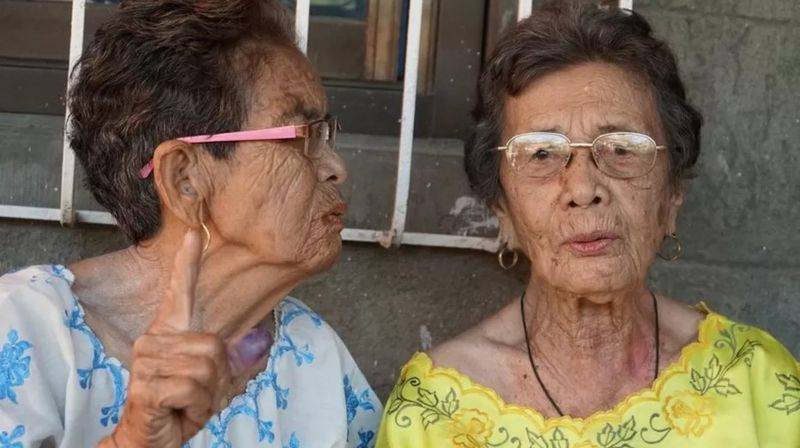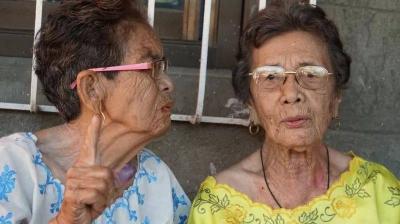A report by the BBC sheds light on the lives of women who were sexually enslaved, as they spend the last years of their lives. They are known as "comfort women" who were forced to work in military brothels in South Korea, the Philippines, Taiwan, China, and Indonesia by the Imperial Japanese Army. Reporters Joel Guinto and Verma Simonet describe how these women live with painful memories that they bitterly recall whenever they visit the abandoned house of slavery: "Bilar Galang, using her crutches, stumbles into a room filled with ladies in their eighties in a quiet Filipino town, suddenly struggles to remember why she is wearing her favorite pink dress. The eighty-eight-year-old woman glances quickly at her sister-in-law Maria Kilantang, a sign to refresh her memory. The two women find themselves in another gathering of women sexually enslaved during World War II - known as the "comfort women," nearly 20 of whom present in an agricultural village in Mabaniki are among the last survivors in the Philippines."
The report states, “When they were teenagers, they were kidnapped from their homes, dragged down dusty roads, and imprisoned in a blood-soaked house where they were raped repeatedly. Now, despite being in their eighties, they continue to struggle for a public apology and compensation from Japan, issues that have eluded them for decades. The women recount their tragedies to those willing to listen, hoping not to be forgotten by the world, even as their memories fade. There were nearly 200,000 of them, mostly Korean. In South Korea, their number has now dwindled to nine, and the last known survivor in Taiwan died last May, with Japan's refusal to confront its wartime past and pay reparations becoming a source of tension with its neighbors.”
**Peace Treaty**
In a 1951 peace treaty with Japan, the Philippines agreed to waive its compensation claims for war violations. Despite the "comfort women" rejecting this, the Philippines, which considers Japan a major source of development aid, refuses to pressure Tokyo. Kilantang states, “We hope to achieve justice before we die,” she is the leader of the group and the most articulate, adding "There are only a few of us left, and we are all in our final days."
On a hot afternoon, the group, calling themselves "Malaya Lolas" or “Free Grandmothers” in Filipino, gathers as they have been for decades to tell their story through slow a cappella songs. "We cried, we begged for a little compassion, their brutal hearts desired only gratification, at the age of fourteen, I was poisoned,” sings the Malaya Lolas group.
Kilantang lightens the mood among her grandmother companions by joking, saying: “Singing in front of an audience is no different from karaoke; there is no worry that eating apricots can’t soothe.” Then, Kilantang turns serious; she was eight years old when she was sexually assaulted in that red house in the middle of a rice field. To this day, she experiences sudden memories when she sees that house along the highway, though it is partially collapsed, it still stands and now attracts ghost hunters and historians.
Several fragile buildings from World War II still exist in the grandmothers' village, located in the town of Candaba, two hours’ drive north of the capital Manila, although it is now better known for duck eggs and tilapia farms than for its dark past during the war. Kilantang notes that other ordinary things also trigger painful memories; when she sees rain-soaked soil, she recalls being held captive when her only water source was the deep footprints of the carabaos that plowed the rice fields. “What we carry is a very heavy burden,” she adds, “I had many dreams when I was a child.”
Kilantang asserts that this ordeal robbed her of her childhood, good education, and happy family life, as her father died during the war. "I could have worn beautiful clothes as a young girl, instead, we constantly moved from place to place, fearing the Japanese." However, she considers herself lucky because she married a farmer and started a family; many other Filipino comfort women suffer discrimination in their communities and even in their families.
She watches her days pass slowly from the window of her home in Mabaniki; when she was younger, she was one of the most active members of Malaya Lolas. She says, “I participated in many protests, I went to Japan, Hong Kong, and even Europe; the lawyers who assist us take us to all these places; everything is still clear to me, etched in my mind even though my body is now weak."
After the war, De La Cruz states that she was forced to work and could not attend school because she had to help on her parents' farm. When she married at 16, she clearly remembers how the family shared one chicken instead of throwing a wedding feast. "It would have been nice if Japan offered us something small to cover our daily expenses," Cruz adds.
**Japan**
The BBC reveals Japan's insistence that any attempt by Filipino women to seek compensation must receive support from their government. The group Malaya Lolas made an appeal to force the government to act, which reached the Supreme Court, but to no avail. They also presented their case to the United Nations Committee on the Elimination of Discrimination Against Women (CEDAW), which in March of this year ruled that Manila must compensate the grandmothers and apologize to them for decades of suffering and discrimination.




